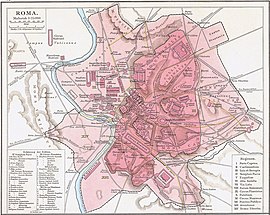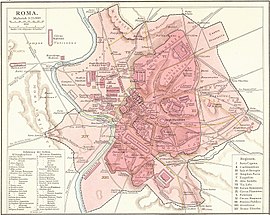The Porta Asinaria is a gate in the Aurelian Walls of Rome.[1] Dominated by two protruding tower blocks and associated guard rooms, it was built between 271 and 275 AD, at the same time as the Wall itself. Unlike most of the other gates, it was not rebuilt or fortified by Honorius or restored by Theoderic.[2]
 External facade of the Porta Asinaria. | |
 Click on the map for a fullscreen view | |
| Location | Rome |
|---|---|
| Coordinates | 41°53′8.4768″N 12°30′31.2552″E / 41.885688000°N 12.508682000°E |
| History | |
| Founded | 271–275 AD |

It is through this gate that East Roman troops under General Belisarius entered the city in 536, reclaiming the city for the Byzantine Empire from the Ostrogoths.
By the 16th century it had become overwhelmed by traffic. A new breach in the walls was made nearby to create the Porta San Giovanni. At this point, the Porta Asinaria was closed to traffic.
See also
edit- Porta Latina – Gate of the Aurelian walls, a landmark of Rome, Italy
- List of ancient monuments in Rome
Notes
editReferences
edit- Platner, Samuel Ball; Ashby, Thomas (1929). "A Topographical Dictionary of Ancient Rome.". London: Oxford University Press. Retrieved 8 June 2022.
- Parker, John Henry (1874). The archaeology of Rome. Retrieved 8 June 2022.
Further reading
edit- Mauro Quercioli, Le mura e le porte di Roma. Newton Compton Ed., Rome, 1982
- Laura G. Cozzi, Le porte di Roma. F.Spinosi Ed., Rome, 1968
- Lucentini, M. The Rome Guide. Interlink books.
External links
edit- Porta Asinaria, Roma Segreta (in Italian)
- Lucentini, M. (31 December 2012). The Rome Guide: Step by Step through History's Greatest City. Interlink. ISBN 9781623710088.
- Media related to Porta Asinaria (Rome) at Wikimedia Commons
| Preceded by Porta Ardeatina |
Landmarks of Rome Porta Asinaria |
Succeeded by Porta Latina |
This article contains text from Platner and Ashby's A Topographical Dictionary of Ancient Rome, a text now in the public domain.

